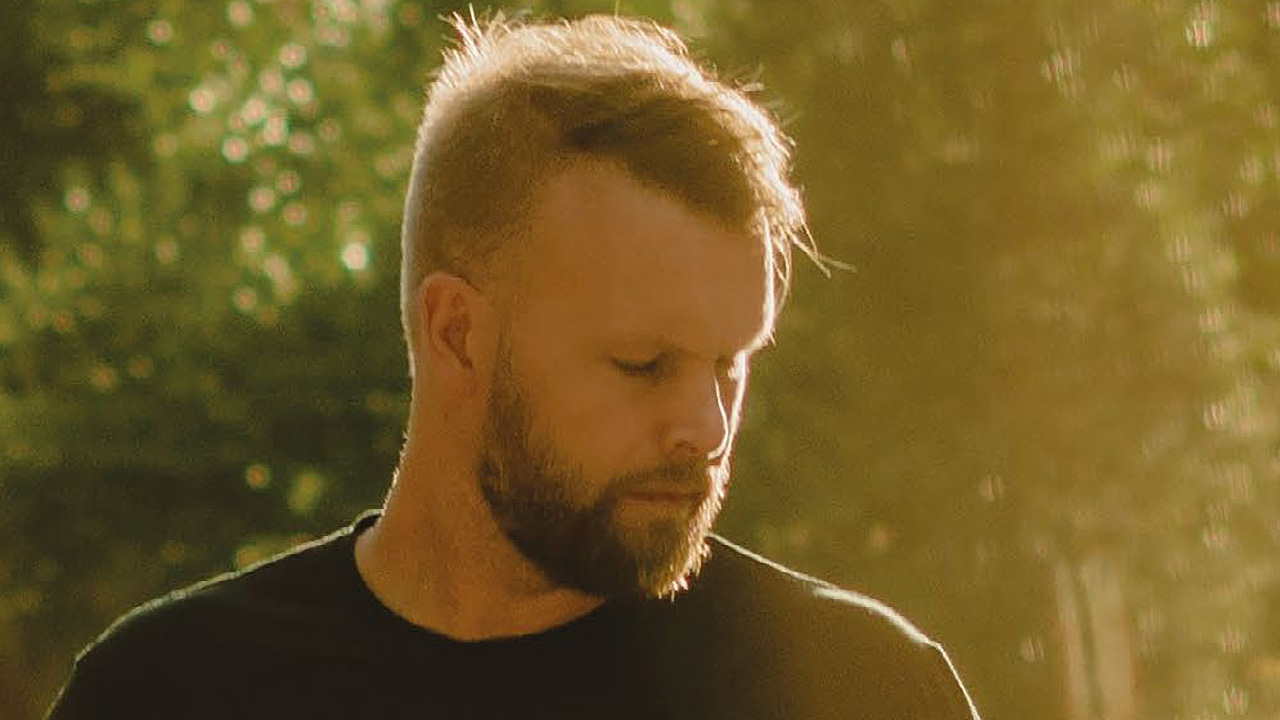Megadeth: "It wasn’t enough to do well, Metallica had to fail too"
Megadeth's Peace Sells... is a cast-iron classic three decades on. Hammer goes back in time get a startling vision of the man behind the madness and music...
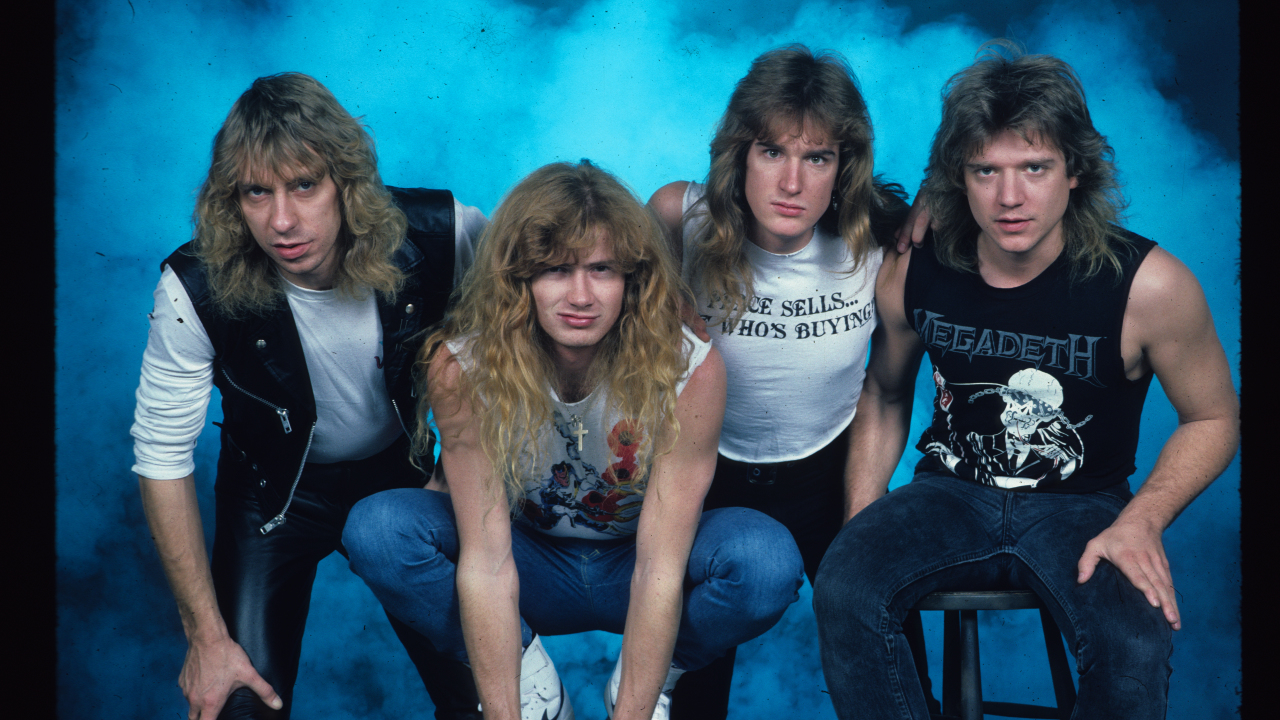
This article originally appeared in Metal Hammer #221.
He was one bad motherfucker. Maybe the baddest ever. This was 1986. Axl Rose was still an unknown hick from the sticks sleeping on floors. Alice Cooper had transmogrified into metal’s own pantomime dame and Ozzy Osbourne was, in his own words, “running around like a fat Joan Collins.”
Maybe only Lemmy came close in terms of gen-u-wine unruliness but Lemmy had a certain dignity and was a gentleman. Dave Mustaine was simply bad. Bad, bad, bad. To the motherfucking bone.
This was the dude who’d been too out of control even for Metallica. He may have co-written most of the best songs on the first two Metallica albums, may have been the extravagantly gifted guitarist who helped forge their unique sound, and hence a whole new genre – thrash, speed, call it what you will, it didn’t even have a name until Mustaine came along and showed the others how to do it, but there had been major flashpoints between Mustaine and the others almost from the day he joined Metallica in 1982.
Like the Sunday afternoon James Hetfield fired Mustaine from the band – before allowing him to talk his way back in. Mustaine had turned up at the bungalow James shared with original bassist Ron McGovney, bringing with him two pit bull terriers. Ron went crazy when the dogs began “jumping all over my car” – a reconfigured 1972 Pontiac LeMans – “scratching the shit out of it.” Ron recalls James running outside and yelling, “‘Hey Dave, get those fuckin’ dogs off of Ron’s car!” Mustaine yelled back: “What the fuck did you say? Don’t you talk that way about my dogs!”
The two men flew at each other and a nasty brawl ensued. According to Ron, “They started fighting and it spilled into the house. I see Dave punch James right across the mouth and he flies across the room, so I jumped on Dave’s back and he flipped me over onto the coffee table.” At which point an upset James got to his feet and told Dave, “You’re out of the fuckin’ band! Get the fuck out of here!” According to Ron, “Dave loaded all his shit up and left all pissed off.” He was back in the band the very next day though.
Mustaine was the guy who got by selling drugs and stealing beer at their gigs; who freaked out Metallica’s first manager, Jonny Z, by getting so drunk the first time they met Jonny found him lying on the street in his own puke and “wondered if I’d made a mistake”; the guitarist who woke up one morning days before Metallica was to record its first album, to be told by James and Lars that his services would no longer be required.
Sign up below to get the latest from Metal Hammer, plus exclusive special offers, direct to your inbox!
But where that would have been the end of the story for most people, for Mustaine it was merely the start of his extraordinary tale. Determined to “out-metal Metallica,” he formed his own band in LA, Megadeth, in which he would not only play lead guitar but sing. Second-in-command would be bassist David Ellefson, an 18-year-old from Minnesota who lived in the same rundown apartment building.
Ellefson recalls Mustaine giving him the full Metallica sob story. “San Francisco, New York… Jonny Z and then the inevitable resentment about it because he wasn’t in the band anymore.” Explaining why he’d been fired, “The main thing was: ‘It was about attitude not ability’. That was his kind of tagline.”
Attitude and ability: two things Megadeth would certainly not lack. This, Mustaine vowed to Ellefson, would be his revenge on Metallica. “It was a vengeful, spiteful return which totally explains the pressure, the angst and frustration… Maybe even to some degree the broken heart that Dave had about being fired. I never got the feeling Dave ever played guitar for money anyway. That never fuelled him.”
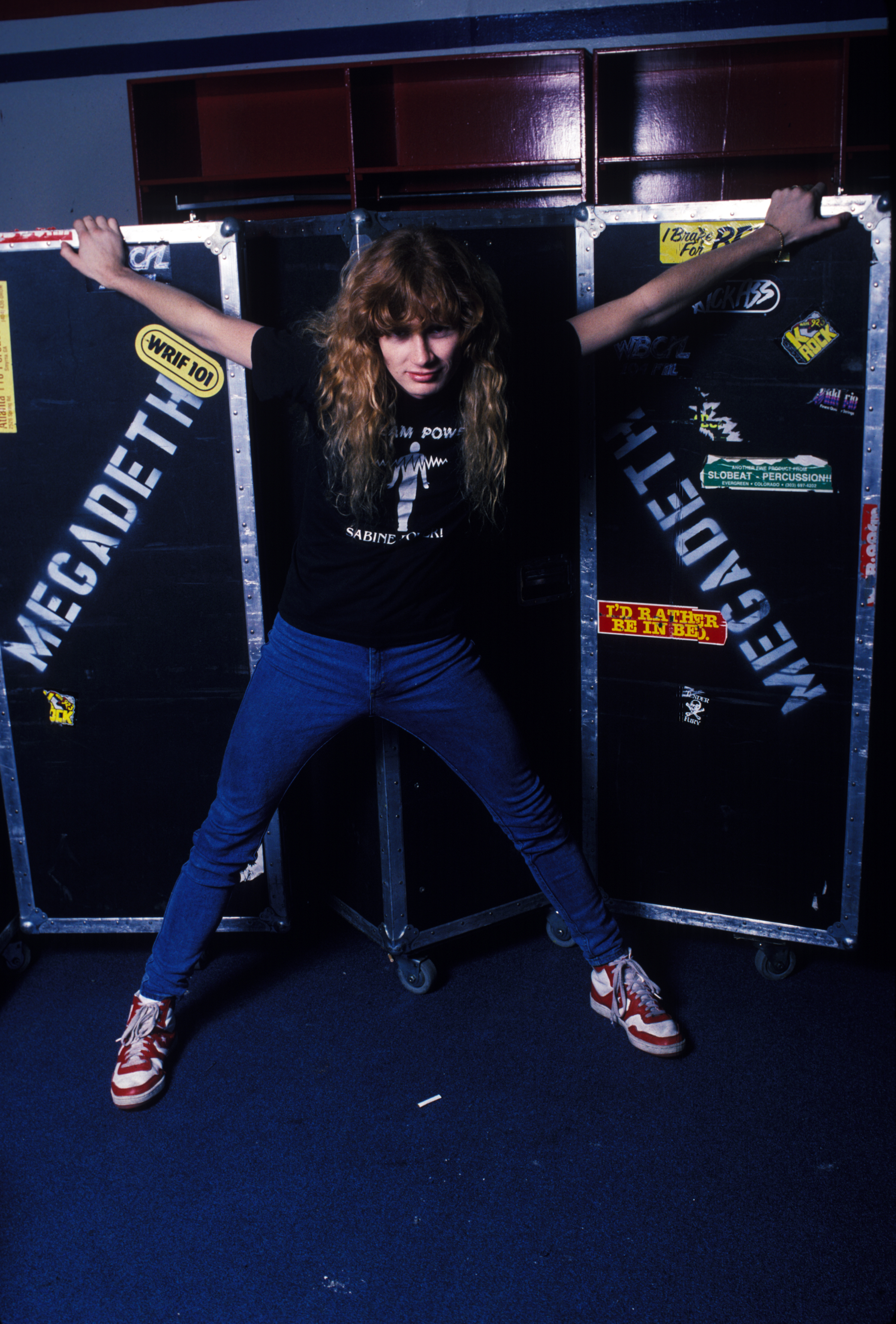
As a result, the first Megadeth album in 1985, a fearfully fast, brutally executed but woefully under-produced bucket of spit called Killing Is My Business… And Business Is Good fitted right in with the nascent thrash movement. By then, though, both Slayer and Anthrax had made their mark on the scene and Megadeth had a lot of catching up to do. It wasn’t until their second album, Peace Sells… But Who’s Buying?, released at the arse-end of 1986, that the rest of the world sat up and took notice.
Irrefutable proof of Mustaine’s blissfully warped talents, not just as guitarist, but as songwriter, singer, band leader and visionary. In Ellefson and the jazz-men out of water, guitarist Chris Poland and drummer Gar Samuelson, Megadeth may have had the most technically proficient ensemble in metal, but in Dave Mustaine the band had something even more important – a true star.
A born leader, as Mustaine later put it to me: “Fuck democracy. Democracy doesn’t work in a band. I had to have my own band and make music exactly the way I wanted to hear it, with no compromises to anybody else’s ego whatsoever.”
Peace Sells… was good enough to sit right alongside the other two thrash classics released that same year: Metallica’s Master Of Puppets and Slayer’s Reign In Blood. Post-apocalyptic, wise after the fact, cynicism tinged with bitter tears of twisted joy… Ellefson recalls sitting on the couch in Mustaine’s apartment as he was sketching out the “amazingly solid rhythm parts” to Peace Sells… tracks like Devil’s Island: “Like slabs of rock.” All eight tracks on Peace Sells…, says Ellefson, “were monsters. They just jumped out at you.”
I first met Mustaine and Ellefson on the promotional trail for Peace Sells…, as guests on a cable TV show I was then presenting. We were running late and our guests hadn’t arrived yet. Then when they did they both went straight to the Gents and locked themselves into the same cubicle. Where they stayed for the next 15 minutes…
When they finally emerged, rubbing their noses and blinking their eyes, I wondered how coherent Mustaine would actually be, whether the whole thing might be a waste of time.
Wrong. Being stoned and staggering around somewhere on the edge where only devils feared to tread, that was a normal day for Dave Mustaine back then.
I watched as they sniffed loudly and leered at the production assistant’s cleavage. Then the interview began. I began by mentioning Metallica but Mustaine cut me short. “I don’t speak ill of the dead…”
Oh, but he did. As soon as we broke for the first video he got into it. How he’d written all the songs, how they were hypocrites for tossing him out when they were all getting fucked-up too, how Lars couldn’t play the drums, Kirk had ripped him off, James was scared of him…
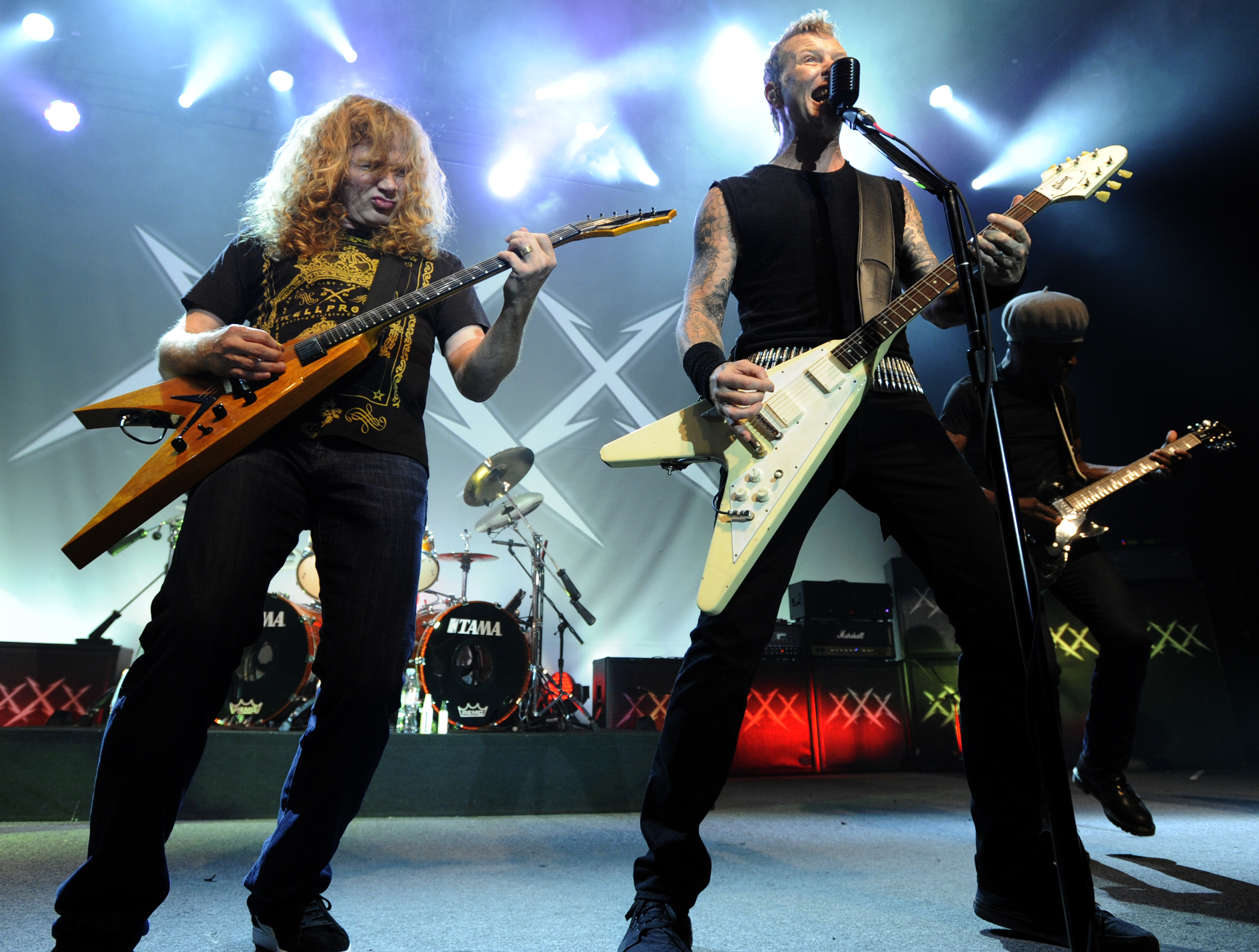
It wasn’t until years later, once he’d cleaned-up and found God, that I was able to get any real perspective from Mustaine. He told me how he’d been born “at the witching hour.” How he’d grown up a peculiar mixture of pot-smoking, booze-guzzling asshole and the proud owner of three black belts in various martial arts.
“I believe in the supernatural,” he said. “My elder sister is a white witch. I dicked around with her stuff when I was a kid. I found a ‘sex hex’ and I used it on this girl I had the hots for – this cute little babe, looked like Tinkerbell. She didn’t want to have anything to do with me. So I did my little hex and the next night she was in my bed.”
“I also did a hex on this guy who picked on me when I was going to school. He was enormous. I did a chant, basically asking the Prince Of Darkness to devastate this fella and stop him messing with me. Later, the guy broke his leg and he can’t walk straight now. I stopped messing with witchcraft after that, but I felt good at the time. Retribution.”
His mind wandered onto how he and Ellefson “once had a suicide pact. We decided that if this band ever went down the tubes, we were going to handcuff ourselves together and do it.” Was that in a dark moment or would he still honour it? “I’d still do it if he would. If the band was over. ’Cos life or death, it doesn’t matter. I’m happy with where I’m at right now, but if I’m dead then I go to sleep as far as my mind goes.”
And he talked frankly about his heroin addiction and what “an asshole” he’d been for much of his professional life. Addiction, he explained, “is hereditary” and that it ran in his family. The five years he’d also been an alcoholic and junkie, he said, had cost him a manager, a long-standing girlfriend, several Megadeth line-ups (Ellefson being the only constant) and perhaps some of his sanity. Or as Ellefson says now, “We went down to hell together.” A descent that had begun in earnest with Peace Sells….
Poland and Samuelson were already hopeless junkies by then, shooting up every day “to feel well.” Although he and Ellefson had long smoked pot and regularly snorted cocaine, at this stage they would ‘only’ smoke or snort heroin. They didn’t see themselves as bad as “the other two.”
It was amazing they managed to make an album at all, let alone one as momentous as Peace Sells…. Recorded nearly a year before it was actually released for the tiny indie label, Combat, the budget was so small they couldn’t afford to do much more than “play it and hope for the best, almost like a gig.”
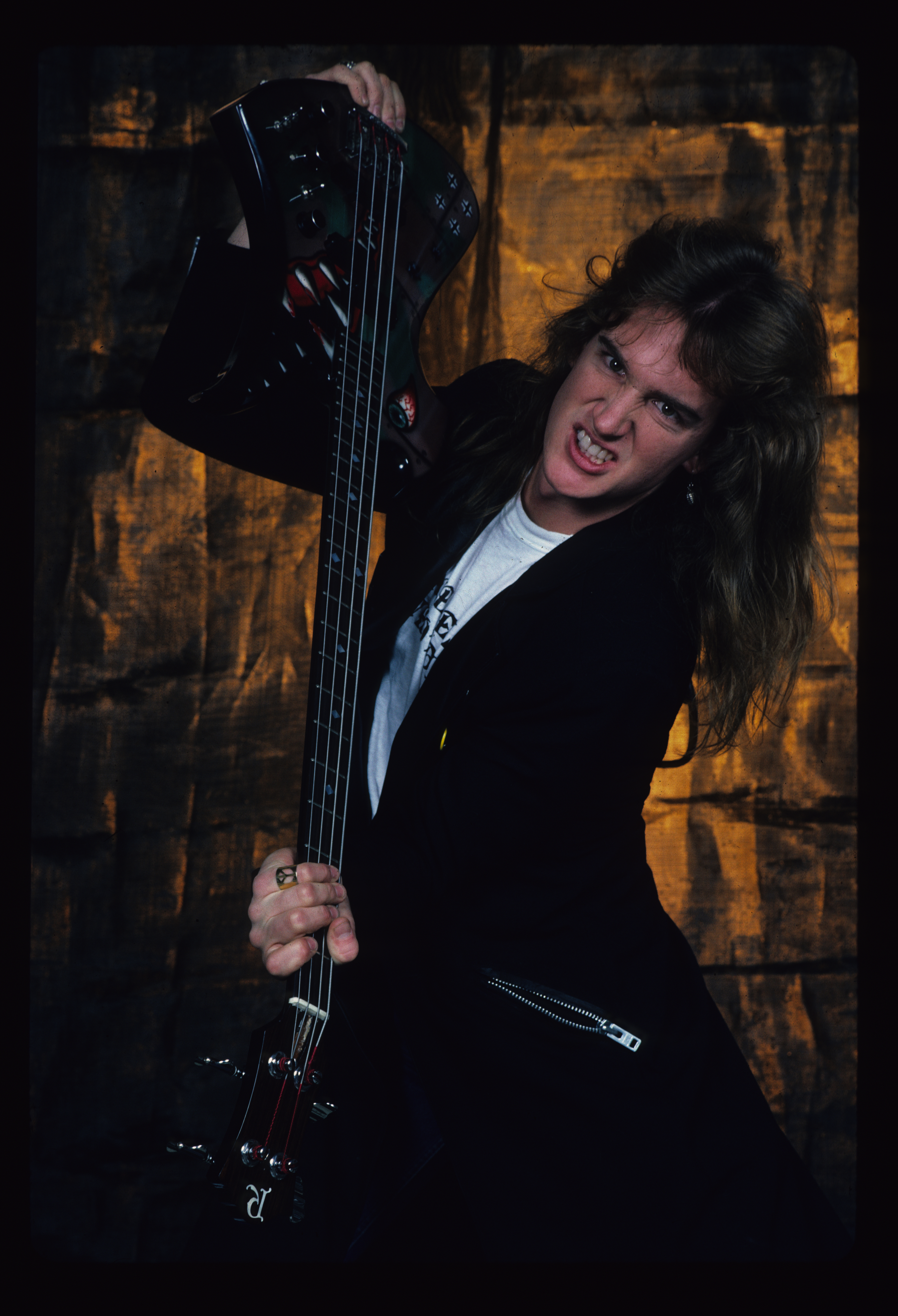
Originally produced by Randy Burns, the result was a sound so thin and wasted when Combat then sold the album to major label, Capitol, they refused to release it until the tapes had been remixed by producer Paul Lani – the reason for the long delay in the album’s release. In the meantime, a frustrated Mustaine stood by and watched as Metallica first major label release, Master Of Puppets, gave them their first gold record for over half-a-million US sales. Something which he admits now he found impossible to shrug off. “It wasn’t enough for Megadeth to do well: I wanted Metallica to fail.”
There was never any question, though, about the quality of the songs on Peace Sells…. While the more unthinking of the metal audience took tracks like the admittedly voluptuously noir incantations of The Conjuring and Omen as signs of Megadeth’s Venom-like fixation with Satan – “They expect us to have dead goats and babies in our buses,” Mustaine complained – it was clear to most fans that Peace Sells… explored a lot of different, often unexpected areas. Starting with the colossal title track…
Inspired by an article Mustaine had seen in Reader’s Digest headlined Peace Would Sell But No One Would Buy It, and built on a gargantuan ball-sack of a bass riff (so arresting it was used for the next 10 years as the theme music to MTV News), the cranium-squeezing sound of Peace Sells… alone was enough to render it an instant metal classic. It was the gimlet-eyed lyrics, though, that really pushed it over into the rarefied margins of true greatness; an incisive screed that dealt with politics, both personal and professional.
- Q&A: Dave Mustaine
- Dave Mustaine to launch Megadeth beer
- The Top 10 Greatest Metallica Riffs Ever
- Slayer look back on three decades of aggression
‘What do you mean I couldn’t be the President of the United States of America?’ Mustaine snarls. ‘Tell me something, it’s still “We the people”, right?’ Then that hook-in-the-brain chorus: ‘If there’s a new way, I’ll be the first in line. But it better work this time…’ Yeah, fuck you, you and you.
Chosen as the first single, Peace Sells… also came with the first ever Megadeth video: an ahead-of-its-time flash-photography mini-masterpiece featuring live footage interspersed with apocalyptic imagery of baton-wielding troops ploughing into protestors, Russian and US aircraft heading towards each other in a real-life devil-horn salute of death, and one wonderful moment where a teenage Megadeth fan is shown watching the video on TV only to be interrupted by his dad who flips channels so he can watch the news. The kid tells him “This is the news” and flips back.
Other tracks followed similarly thought-provoking themes. Devil’s Island was either about the place – a notoriously grim French penal colony – or the 1940 horror movie starring Boris Karloff.
Black Friday was about early Megadeth drummer Dijon Carruthers, a great player who fell foul of Mustaine’s rigidly self-defined ethos when he “lied about being black.” Having told the band he was Spanish, Mustaine felt “that a man that is embarrassed about his family, race or upbringing would never fit our creed.”
And there was opening track Wake Up Dead – a plainly autobiographical number about the guy who creeps home to bed with his girlfriend after a long night on the wrong side of town with “the boys”. Mustaine even mentions his real-life girlfriend’s name, Diana, at the climax of the track. It’s funny, of course, but also sad-funny because it’s true. It also rocks with a cockeyed precision and mental force previously unknown even in the most outlandish thrash circles.
There was also a surprising cover of Willie Dixon’s witchy blues classic I Ain’t Superstitious – a bizarre choice on paper that works with such eccentric charm on record it might have been penned by Mustaine himself back in his hexing days.
There are other highlights too, but the point is that no matter what era Peace Sells would have been released in, it would have been hailed as a classic.
One of the very first albums to carry an ‘Explicit Lyrics – Parental Advisory’ sticker on the back, nobody who bought the album paid any attention to that. They were more drawn to the intriguing cover art: a real ‘statement sleeve’ that describes in lurid ‘fantasy’ detail exactly where the world was at back then in the mid-80s: literally on the brink of nuclear war. In the background, against an orange-red sky, can be seen the devastated United Nations building, as it might be in the aftermath of a nuclear attack. While in the foreground can be seen Megadeth’s grotesque mascot Vic Rattlehead – a more ironic, sickly version of Iron Maiden’s Eddie – leaning nonchalantly against a sign reading ‘For Sale’.
Who, though, was buying? The answer: you. If you knew what was bad for you…
Mick Wall is the UK's best-known rock writer, author and TV and radio programme maker, and is the author of numerous critically-acclaimed books, including definitive, bestselling titles on Led Zeppelin (When Giants Walked the Earth), Metallica (Enter Night), AC/DC (Hell Ain't a Bad Place To Be), Black Sabbath (Symptom of the Universe), Lou Reed, The Doors (Love Becomes a Funeral Pyre), Guns N' Roses and Lemmy. He lives in England.

